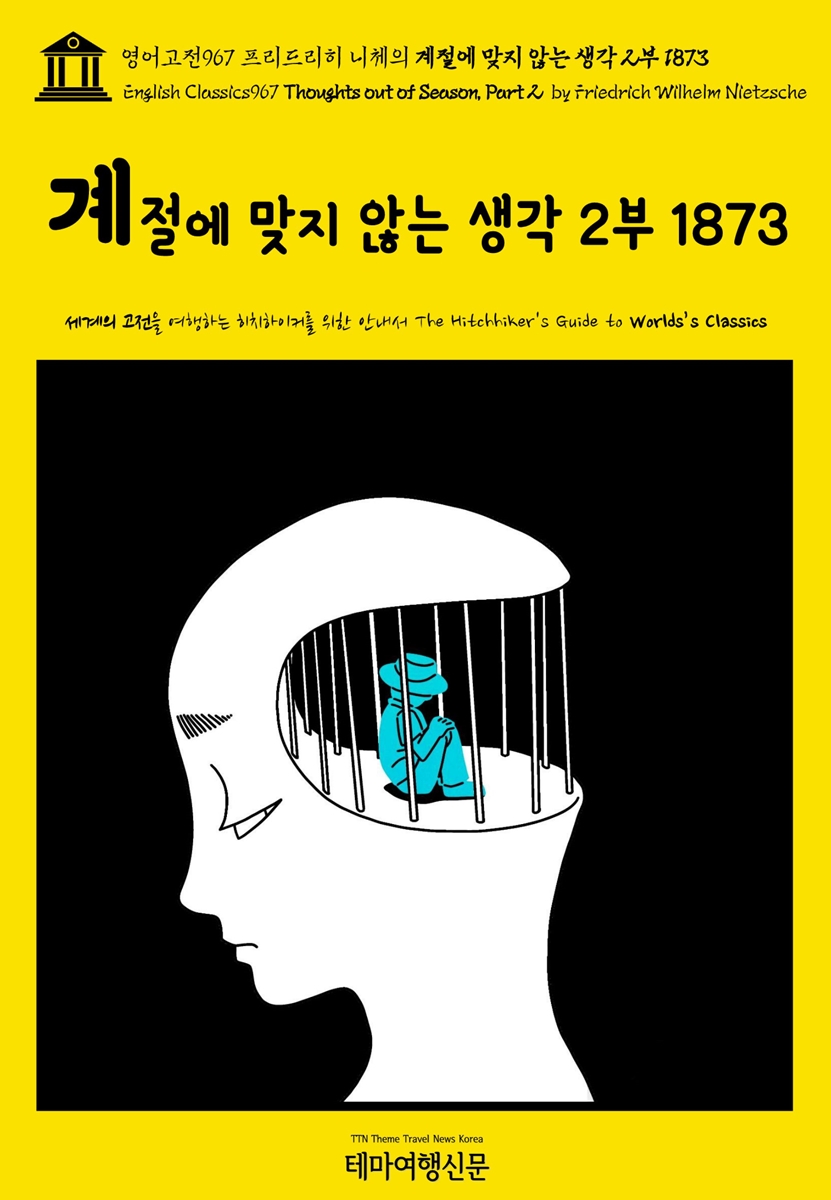▶ 프리드리히 니체의 계절에 맞지 않는 생각 1873(Thoughts out of Season by Friedrich Wilhelm Nietzsche) 혹은 유행에 뒤떨어진 관찰과 계절에 맞지 않은 생각(Unfashionable Observations and Thoughts Out of Season)은 프리드리히 니체(Friedrich Wilhelm Nietzsche, 1844~1900)가 1873년부터 1876년 사이에 집필한 네 편의 작품을 묶은 편집본으로 각각의 에세이는 10여 편으로 분절되어 있습니다. 니체의 유고 노트에 따르면, 그는 총 13개의 주제(The Cultural Philistine, History, The Philosopher, The Scholar, Art, The Teacher, Religion, State War Nation, The Press, Natural Science, Folk Society, Commerce, Language)로 에세이를 기획하였으나, 생전에 완성한 것이 바로 본서에 실린 네 작품입니다.
▶ 각각의 원고는 서로 독립된 작품이지만, 크게 유럽의 현대적인 조건(the contemporary condition of European)이란 주제로 포괄할 수 있으며, 특히 독일 문화에 초점이 맞춰져 있습니다. 이후 출간된 다섯 번째 에세이는 우리 문헌학자들 1874(We Philologists by Friedrich Wilhelm Nietzsche)이란 제목으로 별도로 출간되었으며, 함께 읽어시면 더욱 좋습니다. 테마여행신문 TTN Korea 영어고전(English Classics)과 함께 어제도, 오늘도, 내일도 멋진 문학여행을! B
▶ 생명을 위한 역사의 이용과 남용에 대하여(The Use And Abuse Of History, 1874)는 니체가 역사를 읽는 대안적인 방법(an alternative way of reading history)을 설명한 작품으로 고전적인 휴머니즘(the basic precepts of classic humanism)에 반하는 엘리트주의(elitism)에 기반하고 있습니다. 인류의 대다수(the majoritarian mass of humanity)에 기반을 둔 민주적 근대성(demotic modernity)을 지지하고, 위대한 개인(great individuals)을 신뢰하는 독자와 비평가들에게 불편한 작품이 아닐 수 없습니다.
▶ Are we to continue to work for these creations and write history from the standpoint of the masses; to look for laws in it, to be deduced from the needs of the masses, the laws of motion of the lowest loam and clay strata of society? ▷ 우리는 이러한 창조물을 위해 계속 일하고 대중의 관점에서 역사를 쓸 것인가? 그 안에서 법을 찾고 대중의 필요, 사회의 가장 낮은 양토와 점토층의 운동 법칙에서 추론하려면?
▶ The masses seem to be worth notice in three aspects only: first as the copies of great men, printed on bad paper from worn-out plates, next as a contrast to the great men, and lastly as their tools: for the rest, let the devil and statistics fly away with them! How could statistics prove that there are laws in history? Laws? Yes, they may prove how common and abominably uniform the masses are: and should we call the effects of leaden folly, imitation, love and hunger?laws? We may admit it: but we are sure of this too?that so far as there are laws in history, the laws are of no value and the history of no value either.
▷ 대중은 세 가지 측면에서만 주목할 가치가 있는 것 같습니다. 첫 번째는 낡은 판에서 나쁜 종이에 인쇄된 위인의 사본으로, 다음으로 위인과의 대조, 마지막으로 그들의 도구입니다. 악마와 통계는 그들과 함께 날아갑니다! 통계는 역사에 법칙이 있다는 것을 어떻게 증명할 수 있습니까? 법률? 예, 그것들은 대중이 얼마나 일반적이고 끔찍할 정도로 획일적인지를 증명할 수 있습니다. 우리는 어리석음, 모방, 사랑, 굶주림의 결과를 법이라고 부를까요? 우리는 그것을 인정할 수 있습니다. 그러나 우리는 이것 역시 확신합니다. 역사에 법칙이 있는 한, 법칙은 가치가 없으며 역사도 가치가 없습니다.
▶ 교육자로서의 쇼펜하우어(Schopenhauer As Educator, 1874) : 니체는 비관주의(pessimism)로 유명한 독일 철학자 아르투어 쇼펜하우어(Arthur Schopenhauer, 1788~1860)의 다른 면모 ? 명랑함(cheerfulness), 개인주의(individualism), 정직함(honesty), 확고함(steadfastness) 등 다양한 미덕에도 주목하였습니다. 무엇보다 쇼펜하우어의 철학적 천재성(the philosophic genius of Schopenhauer)이야말로 독일 문화를 부활(a resurgence of German culture)시킬 수 있는 촉매제라고 주장하였습니다.
▶ When the traveller, who had seen many countries and nations and continents, was asked what common attribute he had found everywhere existing among men, he answered, “They have a tendency to sloth.” Many may think that the fuller truth would have been, “They are all timid.” They hide themselves behind “manners” and “opinions.” At bottom every man knows well enough that he is a unique being, only once on this earth; and by no extraordinary chance will such a marvellously picturesque piece of diversity in unity as he is, ever be put together a second time.
▷ 많은 나라와 대륙을 본 여행자가 사람들 사이에 어디에나 존재하는 공통점이 무엇인지 묻자, 그는 "그들은 게으름을 피우는 경향이 있습니다."라고 대답했습니다. 많은 사람들은 더 완전한 진실이 "그들은 모두 소심하군요."였을 것이라고 생각할 수 있습니다 그들은 "매너"와 "의견" 뒤에 자신을 숨깁니다. 근본적으로 모든 사람은 자신이 이 지구상에서 단 한 번뿐인 유일한 존재라는 것을 충분히 잘 알고 있습니다. 그리고 그처럼 놀라운 통일성의 다양성 조각은 결코 두 번째로 합쳐지지 않을 것입니다.






